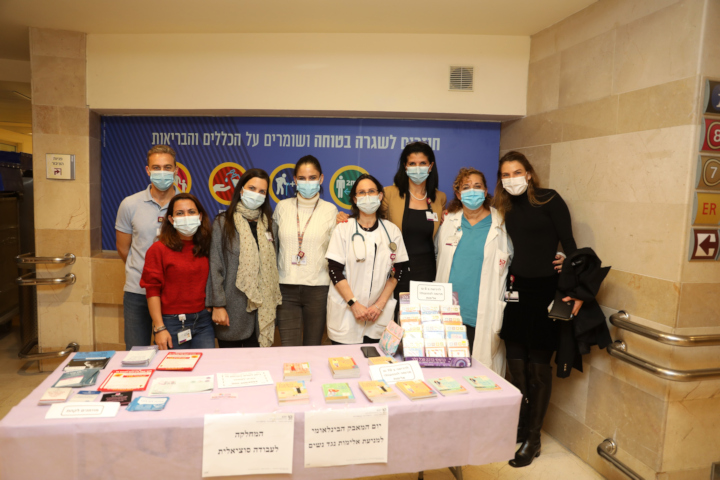Rambam Health Care Campus held a series of events to mark the International Day for the Elimination of Violence Against Women—marked on November 25th, raising awareness of an issue that has become more prominent during the lockdowns and isolation brought on by the COVID-19 pandemic.
 The Center for Sexual Assault Victims' Product Stand in Haifa and the Rambam team. Photography: Rambam HCC
The Center for Sexual Assault Victims' Product Stand in Haifa and the Rambam team. Photography: Rambam HCC
Violence against women and girls is a widespread and devastating phenomenon that often goes unreported. According to data collected for the International Day for the Elimination of Violence Against Women, forty-eight women arrived at the Green-Wagner Department of Emergency Medicine at Rambam Health Care Campus with signs of violence over the past year. In order to raise awareness of relevant signs and hopefully prevent future occurrences of violence against women, Rambam’s Department of Social Work, hospital administration, and senior staff members joined forces to create an important video (in Hebrew) that addresses these issues in detail.
The day was marked by additional events, including a booth set up at the entrance to the hospital’s shopping mall, where the proceeds from products sold were donated to the Center for the Assistance of Victims of Sexual Assault in Haifa. Rambam is keeping the awareness campaign active by offering ongoing lectures and presentations in hospital clinics to reach as wide an audience as possible.
"One in five women will experience an incident of violence during her lifetime," says Dr. Yael Shachor-Meyouhas, Deputy Director of Rambam, who also serves as Chairman of the Hospital's Violence Against Women Committee. "It is important that we give every woman an opportunity to speak and that we look for the signs, especially in suspicious cases. One question can save the life of a woman and prevent her from becoming another statistic." These comments were made against the backdrop of the rising number of women murdered by their partners during 2020 – 16, compared with 12 last year.
"Violence within the family, especially violence against women, tends to worsen in situations of crisis and stress, such as the period we are all living through now," explains Adv. Sagit Ze'evi, Director of Rambam's Department of Social Work. "COVID-19 is another factor that has influenced the increase in the scope of this phenomenon. In many cases, family members stay together 24/7, and the chances of fights and violent situations increase," she says. "Social distancing rules and restrictions on economic activity make it difficult to locate women and families at risk. It is harder for women and children to contact the police or seek social services, making it very difficult to provide care and assistance to those affected by violence."
The data speaks for itself. In 2020, some 200,000 women were violently assaulted by their partners. Rambam urges everyone to take responsibility, to pay attention, to watch for suspicious signs, and to actively care about their relatives, friends and neighbors, because violence can be experienced by anyone.

